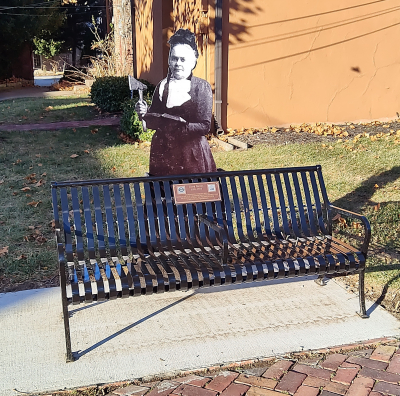Trailblazer Park
Mural and Statue Safari Stop #8
Leavenworth recently installed "character benches" honoring two legends with local connections, Susan B. Anthony and Carry Nation.
While visitors are more than familiar with Susan B. Anthony, preeminent champion of the women's suffrage movement, they often are surprised by her Leavenworth roots. Anthony's brother, Daniel, was an outspoken abolitionist who moved here from New York in 1857 to share his views through stints as a newspaperman, postmaster and two-term mayor. Susan visited him on several occasions, even running his paper and nursing him back to health after an 1875 argument with a rival ended in Daniel being shot. Additional Leavenworth visits brought Susan together with Elizabeth Cady Stanton and other suffragist leaders to argue the case for universal voting rights for both women and African-Americans. A National Votes for Women Trail plaque, the first in Kansas, honors Susan's time in town and can be found on Esplanade Street along the Missouri River, not far from Daniel's former home.
Carry Nation, meanwhile, wanted to be seen as "a bulldog running along at the feet of Jesus, barking at what He doesn't like." However, the nicknames most often associated with her early 1900s activism are "Cyclone Carry" and "Hatchet Granny": Well into her 60s, Nation would burst into saloons armed with a small hatchet and smash every bottle in sight. Like many women associated with the prohibition movement, she lost loved ones to alcohol abuse and sought to save others from "demon liquor," though her methods led to her arrest more than 30 times between 1900 and 1910. Nation visited Leavenworth in March 1901, prompting every saloon in town to close out of precaution; only her host during her stay, the National Hotel, would quietly open its bar for a few sales after she had retired to her room for the evening. Her declining health prompted her second trip to the region, when in January 1911 she was moved to Leavenworth's Evergreen Sanitarium, where she died five months later. She's now buried beside her parents in Belton, MO, where her epitaph reads "Faithful to the cause of prohibition, she hath done what she could."
Future plans for Trailblazer Park include plaques honoring other notable women of Leavenworth history.
























